-
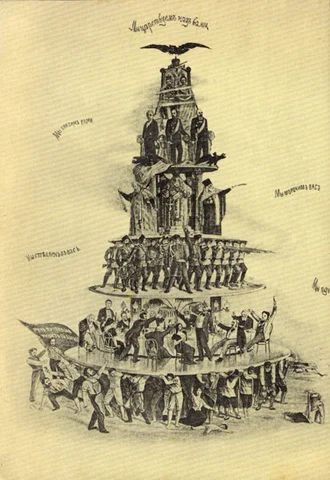 Society is divided between two groups that are the Bourgeoisie and Proletariat. The Bourgeoisie are the upper middle social class and the Proletariat are anything beneath. This is an example of Class conflict, it is where once you are born into a class you can't get out of it and the working class has to hold up everything for little to no pay. Marx put an end to the inequality of classes because abolishes the right to own private property and anything that capitalism calls for.
Society is divided between two groups that are the Bourgeoisie and Proletariat. The Bourgeoisie are the upper middle social class and the Proletariat are anything beneath. This is an example of Class conflict, it is where once you are born into a class you can't get out of it and the working class has to hold up everything for little to no pay. Marx put an end to the inequality of classes because abolishes the right to own private property and anything that capitalism calls for. -
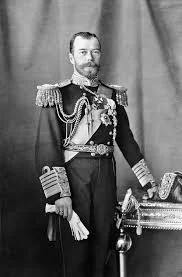 Tsar Nicholas was not prepared to lead because he said that he didn't want to lead and that he is unqualified for the role. Since he felt unqualified his uncle was always in his ear, because of this, it caused the Khodynka Tragedy. The Khodynka Tragedy took pace during Nicholas's coronation day and it was his uncles idea for him to not be with the people and for him to party while everyone else was scrambling for food and caused many people to be trampled.
Tsar Nicholas was not prepared to lead because he said that he didn't want to lead and that he is unqualified for the role. Since he felt unqualified his uncle was always in his ear, because of this, it caused the Khodynka Tragedy. The Khodynka Tragedy took pace during Nicholas's coronation day and it was his uncles idea for him to not be with the people and for him to party while everyone else was scrambling for food and caused many people to be trampled. -
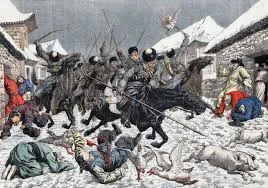 The loss to Japan in the war caused anger and unrest in the Russian public.
The loss to Japan in the war caused anger and unrest in the Russian public. -
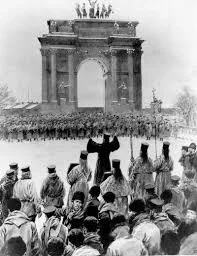 On Bloody Sunday in St Petersburg (one of the biggest cities in Russia), the Russian people lead by Father Gapon, were protesting for better working conditions, better pay, and political freedoms. At the protest there were soldiers all lined up and the protesters were shot and murdered and Father Gapon. Father Gapon was apart of the Clergy, the Clergy is people that are given the religious duty to bring their religion and the word of god to the people.
On Bloody Sunday in St Petersburg (one of the biggest cities in Russia), the Russian people lead by Father Gapon, were protesting for better working conditions, better pay, and political freedoms. At the protest there were soldiers all lined up and the protesters were shot and murdered and Father Gapon. Father Gapon was apart of the Clergy, the Clergy is people that are given the religious duty to bring their religion and the word of god to the people. -
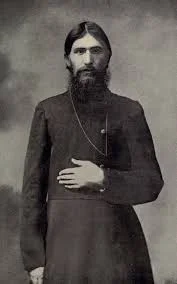 Rasputin was called a mystic and a healer. He was called that because Tsarina Alexandria's son had a blood disease that his blood cannot clot. He was so close with the Tsarina that he was able to start making government choices despite his peasant descent.
Rasputin was called a mystic and a healer. He was called that because Tsarina Alexandria's son had a blood disease that his blood cannot clot. He was so close with the Tsarina that he was able to start making government choices despite his peasant descent. -
 The woman marched/protested all the way up to the Tsar's palace demanding that he step down because of the high price of bread. The Tzar originally was going to disregard this protest because there are woman but he saw that there were thousands against him plus soldiers. After he saw the amount of people against him he stepped down from Tzar.
The woman marched/protested all the way up to the Tsar's palace demanding that he step down because of the high price of bread. The Tzar originally was going to disregard this protest because there are woman but he saw that there were thousands against him plus soldiers. After he saw the amount of people against him he stepped down from Tzar. -
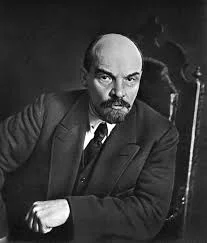 Vladimir Lenin was the first leader of the U.S.S.R, the Germans helped sneak him in by cover train car. He promised the people Freedom, Money, and Bread which caused more people to line up behind him and help him get to power. After he got into the government, he didn't keep his promises because he takes everything away but still makes it bearable.
Vladimir Lenin was the first leader of the U.S.S.R, the Germans helped sneak him in by cover train car. He promised the people Freedom, Money, and Bread which caused more people to line up behind him and help him get to power. After he got into the government, he didn't keep his promises because he takes everything away but still makes it bearable. -
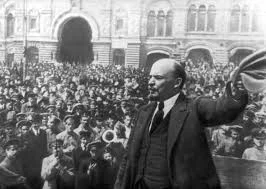 The goals of the October Revolution was to overthrow the provisional government that is only semi-permanent and make immediate peace. The revolution was basically a fight between the Bolsheviks the party of communism and the Mensheviks that are the party does not follow communism. The Bolsheviks would use the system on Soviets, counsel, to further discuss future actions.
The goals of the October Revolution was to overthrow the provisional government that is only semi-permanent and make immediate peace. The revolution was basically a fight between the Bolsheviks the party of communism and the Mensheviks that are the party does not follow communism. The Bolsheviks would use the system on Soviets, counsel, to further discuss future actions. -
 When Russia signed the treaty they gave up Poland, Ukraine, Finland, and the Baltic States to Austria-Hungry and Germany. They signed this because their government and military was on the verge of collapsing.
When Russia signed the treaty they gave up Poland, Ukraine, Finland, and the Baltic States to Austria-Hungry and Germany. They signed this because their government and military was on the verge of collapsing. -
The "New Russia" wasn't fully Communist because no country could be fully Communist. The way that Lenin altered communism is that he let some capitalism in like there could be some private trade, better wages, and working conditions. He did this knowing that the working class would eventually rise up again if there wasn't some relief.
-
War Communism was basically using ideas of communism like restricting agricultural produces to peasants and abolishing private trading for the war effort.
-
The civil war broke out in Russia because of the instability of the government and the economy. There were two separate army's called the Red Arm and White Army and the y were on opposing sides. The Red Army are the communists and they wanted to defend the new government (Communism) and won the civil war. The White Army was the non-communist and they wanted to overthrow the Bolshevik government and go back to pre-revolutionary government.
-
The reason to why the Red Terror happened was to ensure that the people stay in constant submission to the government. During the Red Terror regular people were murdered, arrested, and tortured if they seemed to be against the Bolshevik (Communist) party also leaving Romanovs killed by the Bolsheviks. Go to the next event to see further definition
-
 The people in power during the Red Terror were Vladimir Lenin the leader of U.S.S.R, Leon Trotsky Leader of the Russian Military (Key figure for Vladimir Reign), Felix Dzerzhinsky head of Cheka (Secret Police force), Yakov Sverdlov.
The people in power during the Red Terror were Vladimir Lenin the leader of U.S.S.R, Leon Trotsky Leader of the Russian Military (Key figure for Vladimir Reign), Felix Dzerzhinsky head of Cheka (Secret Police force), Yakov Sverdlov. -
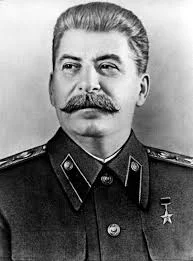 Lenin died from a vascular disease and once he was dead the power was passed on to Joseph Stalin. Joseph Stalin was a General Secretary of the Bolsheviks party until he was put into power. Once he was in power he made the Gulag labor camps, forced executions, and created famines.
Lenin died from a vascular disease and once he was dead the power was passed on to Joseph Stalin. Joseph Stalin was a General Secretary of the Bolsheviks party until he was put into power. Once he was in power he made the Gulag labor camps, forced executions, and created famines. -
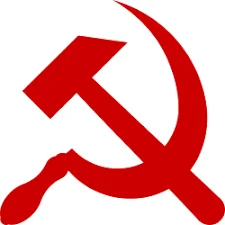 The thing that I have taken away from the revolution was the importance of learning the past so we may learn about other people's mistakes and know how to fix it in the future.
The thing that I have taken away from the revolution was the importance of learning the past so we may learn about other people's mistakes and know how to fix it in the future. -
 I think the Russian people are better off after the revolution because they are able to think for themselves and they are now at least able to purchase food and take care of their family. The lesson that we need to take away from the Russian Revolution is that if people can unite under one flag or even speak of things that make our lives hard to live things will change for the better or for the worse. Go to the next slide to get more info
I think the Russian people are better off after the revolution because they are able to think for themselves and they are now at least able to purchase food and take care of their family. The lesson that we need to take away from the Russian Revolution is that if people can unite under one flag or even speak of things that make our lives hard to live things will change for the better or for the worse. Go to the next slide to get more info